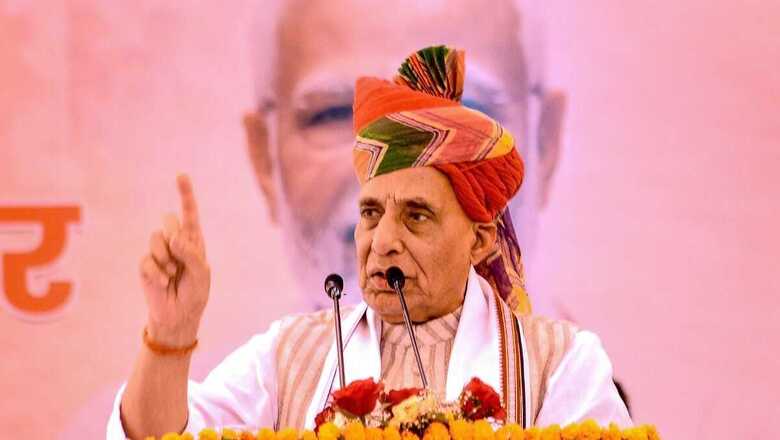
views
Defence minister Rajnath Singh, during an interview with News18, has confirmed that India reserves the right to “target the enemy in his house” (ghar mein ghus ke marenge). The statement gains significance amid a report by The Guardian claiming that India has killed 20 terrorists in Pakistan since 2020. The statement showcases the resolve of the central government to combat foreign-aided proxy wars in it border states. Singh’s utterance is in concert with Prime Minister Narendra Modi’s statement during canvassing for the elections that commence in two weeks.
In 2014, in New York, immediately after the BJP coming to power, during a senior management training activity for all 16 Force Commanders of the ongoing United Nations peacekeeping missions of the world, we were invited to the Pakistani embassy or the Permanent Mission of Pakistan (PMP) to the UN as it is called. The deputy ambassador, an ex-armoured corps officer of Pakistan Army, asked me to explain the strong statements of the newly elected prime minister about terrorism emanating from Pakistan. I told him that having worked closely with Prime Minister Modi, when he was the chief minister of Gujarat (I was the general officer commanding in Ahmedabad), I would advise him to take those threats seriously. The surgical strikes after the Uri attacks and the Balakot air raid after the Pulwama killings proved the point.
It’s not unusual for a strong nation to take on inimical element working abroad. Israel, UK, Russia (as also erstwhile USSR) and US have carried out several ‘out-of-the-country’ operations in far-flung areas like Falkland Islands, Iraq and Afghanistan to safeguard their national interests and security. The Chinese continue to operate aggressively in South China Sea, undermining the sovereignty and integrity of the littoral states like the Philippines and Indonesia.
The India story is different, though. One has seen several cases where anti-India elements working abroad have died recently. Pro-Khalistani leader and chief of Khalistan Liberation Force (KLF) Avtar Singh Khanda, based in the UK, allegedly died of poisoning. Hardeep Singh Nijjer was killed in a shootout outside a gurdwara in Canada’s Vancouver. And then, of course, there was an alleged foiled plot to kill Gurpatwant Singh Pannun in New York.
One thing common among all three was that they worked openly against India and its interests. But India has officially maintained it has no hand in the killing or attempted killing of these people. For, India, it was more the case of those who lived by the sword of ten died by the sword!
In a radio interview in Vancouver during a visit to Canada in 2018, I had made an appeal to the separatists not to try and fuel insurgency in Punjab because their offsprings were safe and prosperous in Canada; whereas the price of their undoing would be paid by the poor people in Punjab. I went to add that if they wanted a Khalistan, they should ask the Canadian government to allot them land in Canada because the community in India, for sure, did not want it.
Any immigrant community, I feel, should be inclusive and must merge with the society in the country of its residence. The French government has rightly come down heavily on the Muslim community, which was insisting on and wanted to have a different identity. The Sikh separatists are a minuscule percentage and mainly living in Canada, US, Australia and UK, but the entire community gets a bad rap and is treated with suspicion.
One may be tempted to believe that India’s intelligence agencies may be working on a new proactive strategy to combat terrorism launched from foreign soil. It may look feasible to imagine India opting for a “low cost high yield option”, by hiring disgruntled lumpen proletariat originating from Pakistan to affect the assassinations. But to connect this issue with The Guardian report is wrong. Rajnath Singh’s statement is a statement of intent against those who are waging war against India from foreign soil. It exhibits the Indian government as a “no nonsense strong government”, which knows how to protect its borders and its citizens within the country as well as in the rest of the world.
A few days back, the Israelis attacked the Iranian embassy in Syria’s Damascus. Even when I was serving on Golan Heights as the Head of the Mission and Force Commander of the peacekeeping mission from 2012 to 2015, the Israelis reserved the right to attack all assets and convoys that carried war-waging material, including SS 400 missiles, meant for Hezbollah in Lebanon and coming from Iran, through Iraq and Syria. They also conveyed through me to the Syrian government that they were not interfering with the internal affairs of Syria and would not initiate any action against the government of President Assad, but would repeatedly attack the assets being smuggled into Lebanon for use by Hezbollah.
The narrative says it all. When you travel in Israel, all the tour guides are given the same narrative and while narrating the history of Israel, besides the Holocaust; they stress upon the Munich Olympics killing of 11 Israeli athletes by eight Palestinian terrorists and how Mossad had deftly dug out each and everyone involved in the killings from all the corners of the globe and eliminated them.
‘New India’ today is showing a similar intent. It is not averse to threatening inimical elements operating from foreign soil. As the Uri and Balakot operations show, India is capable of carrying out operations on foreign soil. However, any attempt to connect Rajnath Singh’s comment with The Guardian report would be mischievous, to say the least.
(The author was Head of the Mission and Force Commander of UN Peacekeeping Mission (UNDOF) between Israel and Syria at Golan Heights from 2012 to 2014. Views expressed in the above piece are personal and solely those of the author. They do not necessarily reflect News18’s views)




















Comments
0 comment